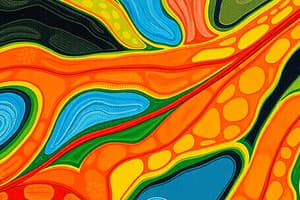Podcast
Questions and Answers
What type of tissue is primarily involved in growth at the tips of roots and shoots?
What type of tissue is primarily involved in growth at the tips of roots and shoots?
- Sclerenchyma
- Permanent Tissue
- Apical Meristem (correct)
- Intercalary Meristem
Which tissue is responsible for the transport of water and minerals in plants?
Which tissue is responsible for the transport of water and minerals in plants?
- Collenchyma
- Phloem
- Xylem (correct)
- Parenchyma
Which simple permanent tissue provides flexible support to plant structures?
Which simple permanent tissue provides flexible support to plant structures?
- Parenchyma
- Xylem
- Sclerenchyma
- Collenchyma (correct)
What type of tissue is made up of multiple cell types that function together?
What type of tissue is made up of multiple cell types that function together?
Which tissue type is capable of continuous division and growth?
Which tissue type is capable of continuous division and growth?
Which type of meristematic tissue is responsible for secondary growth in thickness?
Which type of meristematic tissue is responsible for secondary growth in thickness?
Which of the following permanent tissues is involved in storing food and aiding metabolism?
Which of the following permanent tissues is involved in storing food and aiding metabolism?
What is the primary function of sclerenchyma tissue?
What is the primary function of sclerenchyma tissue?
Flashcards are hidden until you start studying
Study Notes
Types of Plant Tissues
-
Meristematic Tissues
- Composed of undifferentiated cells.
- Capable of continuous division and growth.
- Found in regions of growth (roots, shoots).
-
Permanent Tissues
- Differentiated cells that have specific functions.
- Do not divide (most cases) after maturation.
- Subdivided into simple and complex tissues.
Functions Of Plant Tissues
-
Meristematic Tissues
- Provide growth in length (apical meristems) and girth (lateral meristems).
- Aid in forming new organs (roots, leaves).
-
Permanent Tissues
- Support and structure (sclerenchyma, collenchyma).
- Conduct nutrients and water (xylem, phloem).
- Store food (parenchyma).
- Protect against pathogens and physical injury (epidermis).
Plant Tissue Organization
- Simple Tissues
- Composed of a single cell type.
- Types: Parenchyma, Collenchyma, Sclerenchyma.
- Complex Tissues
- Composed of multiple cell types.
- Types: Xylem (water transport), Phloem (nutrient transport).
Meristematic Tissues
-
Apical Meristem
- Located at tips of roots and shoots.
- Responsible for primary growth (length).
-
Lateral Meristem
- Includes vascular cambium and cork cambium.
- Responsible for secondary growth (girth).
-
Intercalary Meristem
- Located at internodes or leaf bases.
- Contributes to regrowth of plants after cutting.
Permanent Tissues
-
Simple Permanent Tissues
- Parenchyma:
- Thin-walled, involved in storage and metabolism.
- Collenchyma:
- Thick-walled, provides flexible support.
- Sclerenchyma:
- Thick-walled, provides rigid support, dead at maturity.
- Parenchyma:
-
Complex Permanent Tissues
- Xylem:
- Transports water and minerals; consists of tracheids, vessel elements, and fibers.
- Phloem:
- Transports sugars; consists of sieve elements and companion cells.
- Xylem:
Types of Plant Tissues
- Meristematic tissues consist of undifferentiated cells that can continuously divide and promote growth.
- Found in areas of active growth such as the tips of roots and shoots.
- Permanent tissues are comprised of differentiated cells that perform specialized functions and typically do not divide after maturation.
- Permanent tissues are categorized into simple (one cell type) and complex (multiple cell types) tissues.
Functions Of Plant Tissues
- Meristematic tissues facilitate growth in length through apical meristems and in girth through lateral meristems.
- Permanent tissues contribute to plant support and structure with sclerenchyma and collenchyma.
- They are essential for nutrient and water conduction via xylem and phloem.
- Storage of food occurs in parenchyma, while the epidermis protects plants from pathogens and physical damage.
Plant Tissue Organization
- Simple tissues include parenchyma (storage and metabolism), collenchyma (flexible support), and sclerenchyma (rigid support).
- Complex tissues consist of xylem for water transport and phloem for the transport of nutrients, such as sugars.
Meristematic Tissues
- Apical meristem is located at the tips of roots and shoots, driving primary growth (length).
- Lateral meristem includes vascular cambium and cork cambium, facilitating secondary growth (girth).
- Intercalary meristem is located at internodes or leaf bases, playing a role in regrowth after plant cutting.
Permanent Tissues
- Simple permanent tissues consist of parenchyma (thin-walled and involved in storage), collenchyma (thick-walled for flexible support), and sclerenchyma (thick-walled, providing rigid support, and dead at maturity).
- Complex permanent tissues are comprised of xylem, which transports water and minerals through tracheids, vessel elements, and fibers, and phloem, responsible for sugar transport through sieve elements and companion cells.
Studying That Suits You
Use AI to generate personalized quizzes and flashcards to suit your learning preferences.




